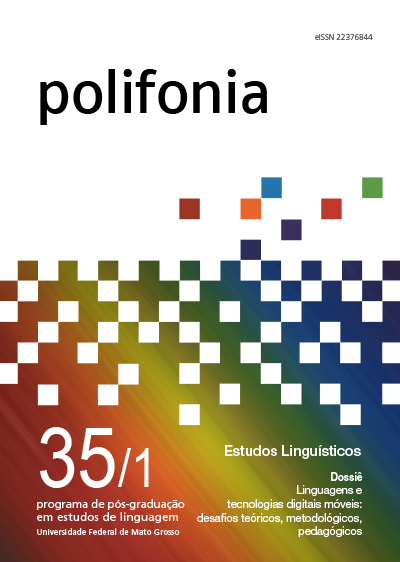Aprendizagem móvel no contexto de formação continuada: um estudo sobre affordances emergentes de interações de professores de inglês via WhatsApp
Palavras-chave:
Aprendizagem móvel, formação de professores, affordanceResumo
Com base no conceito de affordance, discutimos neste artigo a integração de dispositivos móveis na formação continuada de professores de inglês e investigamos as percepções desses professores sobre o uso desses dispositivos, bem como as ações advindas dessas percepções. Os resultados, pautados na análise do corpus gerado nas interações via WhatsApp e de um questionário, indicam que os professores percebem os dispositivos e aplicativos móveis como ferramentas que podem ser usadas em sua formação e prática. As affordances mais recorrentes, entretanto, referem-se ao uso dos materiais de áudio produzidos durante as interações via WhatsApp para o desenvolvimento das habilidades orais dos próprios participantes.
Referências
ALMEIDA, R.; ARAÚJO JR, C. O uso de dispositivos móveis no contexto educativo: análise de teses e dissertações nacionais. Tempos e Espaços em Educação, v.6. n. 11, p.25-36, 2013.
BARAN, E. A Review of research on mobile learning in teacher education. Education, Technology & Society, v. 17, n.4, p. 17-32,2014.
BATEMAN, T. Smartphones give you wings: Pedagogical affordances of mobile Web 2.0. Australian Journal of Educational Technology, v. 26, n.1, p. 1-14, 2010.
BURDEN, K.; ATKINSON, S. Evaluating pedagogical affordances of media sharing Web 2.0 technologies: A case study. In: ATKINSON, R.; MCBEATH, C. (Eds.). Hello! Where are you in the landscape of educational technology? Proceedings of the 25th ASCILITE Conference. Melbourne, Australia: Deakin University, 2008. p. 641-652. Disponível em: <http://www.ascilite.org/conferences/melbourne08/procs/>. Acesso: 01 mar. 2016.
BRAGA, J. C. F. English language teaching on the wings of mobility: a study on the affordances of mobile learning in classroom practice. In: OLIVEIRA, A. L. A. M.; BRAGA, J. C. F. (Org.). Inspiring Insights from an English Teaching Scene. Belo Horizonte: CEI-Curso de Especialização em Ensino de Inglês, 2017. p. 149-171
CAPRA, F. A teia da vida: uma nova compreensão científica dos sistemas vivos. Trad. de Newton R. Eichemberg. São Paulo: Cultrix, 1999.
CHURCHILL, E. A dynamic system account of learning from ecology to form relations. Applied Linguistics, Oxford University Press, v. 29, n. 3, p. 339-358, 2007.
CROMPTON, H. A historical overview of mobile learning: towards learner-centered education. In: BERGE, Z.; MUILENBURG, L. (Ed.). Handbook of mobile learning. New York: Routledge, Muillenburg and Berge, 2013. p. 3-14
GIBSON, J. J. The ecological approach to visual perception. Hillsdale, NJ: Erlbaum, 1986.
DÖRNYEI, Z. Research Methods in Applied Linguistics: quantitative, qualitative and mixed methodologies. Oxford, New York: Oxford University Press, 2007.
HOLIDAY, A. Doing and Writing Qualitative Research. London: Sage, 2002.
KUKULSKA-HULME, A. Aligning Migration with Mobility: female immigrants using smart technologies for informal learning show the way. Presented at
UNESCO Mobile Learning Week Symposium. Paris, France, 2013. Disponível em: http://www.unesco.org/new/fileadmin/MULTIMEDIA/HQ/ED/ICT/pdf/Kukulska-Hulme.pdf. Acesso em: 15 set. 2015.
______.; TRAXLER, J. Mobile Learning: a handbook for educators and trainers. Abingdon, New York: Routledge. 2005.
MCLUHAN, M. Understanding Media: The Extensions of Man. Cambridge, MA: MIT Press, 2001.
NICHOLAS, H.; NG, W. Mobile Seamless Learning and its Pedagogy. In: WONG, L. H.; MILRAD, M.; SPECHT, M. (Ed.). Seamless Learning in the Age of Mobile Connectivity. London: Springer, 2015. p. 261-280.
MCLOUGHLIN, C.; LEE, M. Social software and participatory learning: Pedagogical choices with technology affordances in the Web 2.0 era. In: ICT: Providing choices for learners and learning. Proceedings ascilite Singapore 2007. Disponível em: <http://www.ascilite.org.au/conferences/singapore07/procs/mcloughlin.pdf> Acesso em: 01 mar. 2016
NORMAN, D. A. Affordance, conventions, and design. Interactions, 1999, 6.3, p. 38–43. Disponível em: <http://dx.doi.org/10.1145/301153.301168>. Acesso em: 01 mar. 2016
TRAXLER, J. Defining, Discussing and Evaluating Mobile Learning: The moving finger writes and having writ. The International Review of Research in Open and Distributed Learning, [S.l.], v. 8, n. 2, jun. 2005.
UNESCO. Diretrizes de políticas para aprendizagem móvel 2014. Disponível em:<http://unesdoc.unesco.org/images/0021/002196/219641e.pdf>. Acesso em: 01 fev. 2015.
VAN LIER, L. Interaction in the Language Curriculum: awareness, autonomy e authenticity. London and New York: Longman, 1996.
______. From input to affordance. In: LANTOLF, J. P. (ed). Sociocultural theory and second language learning. Oxford University Press, Oxford, 2000. p.245-259.
______.The ecology and semiotics of language learning: a sociocultural perspective. Boston: Kluwer Academic Publishers, 2004.
______. An ecological-semiotic perspective on language and linguistics. In: KRAMSCH, C. (Ed.). Language acquisition and language socialization: ecological perspectives. London: Continuum, 2002. p. 140-164.
PAIVA, V. L. M. O e. Affordances for language learning beyond the classroom. In: BENSON, P.; REINDERS, H. Beyond the language classroom. New York: Palgrave Macmillan, 2011. p. 59-71.
PACHLER, N. Research methods in mobile and informal learning: Some issues. In.: VAROULA, G.; PACHLER, N.; KUKULSKA-HULME,A. (Eds). Research Mobile Learning: Frameworks, Tools and research Desingns. Oxford: Peter Lang, 2009. p. 01-15.
PEGRUM, M. Mobile learning: languages, literacies and cultures. London: Palgrave Macmillan, 2014.
PUENTEDURA, R. A brief introduction to TPCK and SAMR. Freeport workshop slides, 8 December. Ruben R. Puentedura’s weblog. 2012. Disponível em: <http://www.hippasus.com/rrpweblog/archives/2011/12/08/BriefIntroTPCKSAMR.pdf> . Accesso em: 05 ago. 2015.
ROYLE, K. STAGER, S. TRAXLER, J. Teacher development with mobiles: comparative critical factors. Prospects, 44 (1), p. 29-42, 2014.
SANTOS COSTA, G. S. Mobile Learning: explorando potencialidades com o uso do celular no ensino-aprendizagem de língua inglesa como língua estrangeira com alunos da escola pública. 182 p. Tese (Doutorado em Letras) – Centro de Artes e Comunicação, Universidade Federal de Pernambuco, Recife, 2013.
SARMENTO, M. J. O estudo de caso etnográfico. In: ZAGO, Nadir; CARVALHO, Marília Pinto; VILELA, Rita T. (Org.). Itinerários de Pesquisa: Perspectivas qualitativas em Sociologia da Educação. Rio de Janeiro, DP&A, 2003.
SACCOL A., SCHLEMMER E. e BARBOSA J. m-learming e u-learning – novas perspectivas da aprendizagem móvel e ubíqua. São Paulo: Pearson, 2011.



